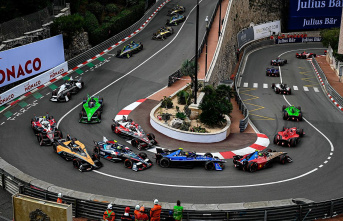No sooner does the combustion engine dispute appear to have been resolved than the next traffic conflict is looming in the traffic light coalition. The Greens are critical of an initiative by Finance Minister Christian Lindner (FDP). He had told the German Press Agency on Sunday that he wanted to reduce taxes on cars powered by so-called e-fuels.
The public response from the Greens came a day later via the "Augsburger Allgemeine": "Instead of thinking about possible subsidies for niche products in ten years, the Minister of Finance should finally get going and tackle what is already on the table," said the deputy leader of the Greens parliamentary group, Julia Verlinden.
The governing parties have agreed on numerous projects over the past year and a half. Some of these have not even been started by the Ministry of Finance or are being blocked, Verlinden criticized. This includes a reform of the distance allowance from ecological and social points of view and the reduction of environmentally harmful subsidies, said Verlinden. As an example, she cited a conversion of the company car privilege.
Dispute over e-fuels - and no end in sight
The background to the looming conflict is the agreement between the Federal Government and the EU Commission, according to which cars with combustion engines should still be permitted after 2035 if they are only fueled with climate-neutral e-fuels.
E-fuels can be produced using renewable electricity from water and carbon dioxide extracted from the air. Unlike petrol or diesel, they do not release any additional climate-damaging gases. Critics complain that they are needed more urgently in shipping and aviation and are also very energy-intensive to produce.
The EU states want to vote this Tuesday on the planned ban on non-climate-neutral new vehicles from 2035. The permanent representatives of the member states in Brussels approved a corresponding proposal by the current Swedish EU Council Presidency on Monday, as a spokesman announced. The EU Commission and the federal government had previously agreed on an additional declaration that would enable cars with internal combustion engines to be used exclusively with e-fuels in the future.
Agreement in Brussels?
A spokesman for the Federal Ministry of Transport said on Monday in Berlin, with a view to the meeting of the Permanent Representatives Committee, that "from our point of view there is nothing more to say against giving the green light to the fleet limit value regulation and thus to the Fit-for-55 program. " This is "a very good signal".
The CSU European politician Markus Ferber sees it differently: "Apart from a loss of trust on the Brussels floor, a public traffic light dispute on the subject of e-fuels and the prospect of a solution to the preservation of the combustion engine, very little has been achieved so far." He also doubts that the path found in the compromise can be put into practice so easily.
According to this, new cars powered by e-fuels are to be made possible after 2035 by a so-called delegated legal act by the EU Commission. However, the EU Parliament and EU states can raise objections to this for two months.
The Deutsche Umwelthilfe (DUH) complained on Monday: "There will be no e-fuels available for car traffic, and certainly not actually climate-neutral." If e-fuels are not available after 2035 or only in very small quantities at very high prices, e-fuel vehicles would continue to fill up with fossil fuel, speculated DUH federal manager Jürgen Resch. "Should the CO2 regulation be passed with this loophole the size of a barn door, we will consider legal action."
On the other hand, the motor vehicle trade welcomed the solution found between the Federal Government and the EU Commission on Monday. It opens the way to get the industrial production of large quantities of so-called e-fuels going, said the general manager of the Central Association of German Motor Trades (ZDK), Kurt-Christian Scheel, according to the announcement.
According to Scheel, the solution could also boost economic power in countries outside of Europe that have an abundance of renewable energy. "Because e-fuels are liquefied green electricity that can be transported and stored." The most important thing now is for the EU to implement the solution quickly and with legal certainty.







